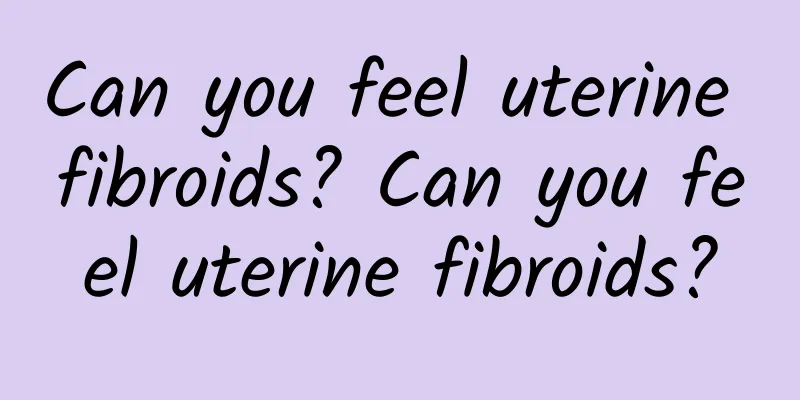Can you feel uterine fibroids? Can you feel uterine fibroids?

|
Uterine fibroids are a common gynecological disease. They are benign tumors that arise from the smooth muscle cells of the uterus. Many women may suffer from uterine fibroids during their childbearing years, but many women do not know much about this disease, especially about how they feel about uterine fibroids. Below, I will introduce some basic information about uterine fibroids and how they feel. First of all, uterine fibroids are a disease that grows gradually over time, and may not cause obvious symptoms at first. But as the fibroids grow, they may have some effects on the body, causing some uncomfortable symptoms. For example, when the fibroids grow and compress the organs near the uterus, it may cause the following: 1. Abnormal uterine bleeding: Uterine fibroids often lead to increased menstrual volume, prolonged menstruation, and even intermittent bleeding. This is because fibroids can destroy the normal endometrium, leading to irregular bleeding. 2. Abdominal pain and pressure: When the fibroids grow, they can compress the tissues and nerves around the pelvis, causing abdominal pain and discomfort. Some women may feel abdominal distension, discomfort, or a "heavy" feeling in the abdomen. 3. Difficulty urinating and frequent urination: If uterine fibroids compress the bladder, women may experience difficulty urinating or frequent urination. This is because the pressure of the fibroids prevents the bladder from expanding fully, resulting in the inability to discharge urine smoothly. The above symptoms are not common in every woman with uterine fibroids. Each woman's physical condition and the growth of the fibroids may affect the manifestation of the symptoms. Some women may not feel anything obvious and only discover the presence of fibroids during a routine gynecological examination. For the sake of popular science, we also need to understand whether uterine fibroids have their own feelings. From a scientific point of view, fibroids themselves do not have a nervous system, so they have no pain perception. In other words, uterine fibroids themselves cannot feel pain or other discomfort. However, it can cause a series of symptoms by affecting surrounding tissues and organs. In summary, uterine fibroids are a common gynecological disease. Most women may experience abnormal uterine bleeding, abdominal pain and pressure, difficulty urinating, frequent urination and other discomfort symptoms due to the enlargement of fibroids. However, uterine fibroids themselves do not have pain perception, they only cause symptoms by compressing surrounding tissues. If you suspect that you have uterine fibroids, it is recommended to consult a professional doctor for diagnosis and treatment. Early detection and treatment of uterine fibroids is very important for women's health. |
<<: What causes uterine fibroid torsion? What causes uterine fibroid torsion?
Recommend
Experts explain the causes of ectopic pregnancy
Ectopic pregnancy is a very dangerous gynecologic...
What are the examination items for congenital absence of vagina?
Women do not want to have gynecological diseases,...
Are there any side effects of amenorrhea medication?
As we all know, regular menstruation is very impo...
Hyperprolactinemia Specialized Hospital
I believe that everyone knows the harm that hyper...
Nosebleeds in adults are a sign of physical problems
Nosebleeds in adults are a sign of physical probl...
What is pelvic inflammatory disease and how to treat it
As a type of gynecological disease, pelvic inflam...
13 weight loss tips to keep you from gaining weight in autumn and winter
1. A glass of water in the morning When you wake ...
What to do with pelvic fluid accumulation after hysterectomy
What to do if there is pelvic fluid accumulation ...
Causes of chocolate cysts
Causes of chocolate cysts: Ovarian chocolate cyst...
What are the types of endometrial tuberculosis?
Endometrial tuberculosis is an inflammation of th...
Will menopause heal on its own?
Menopause is a common gynecological disease, whic...
Can acupuncture be used to treat irregular menstruation?
Acupuncture is one of the external treatment meth...
What causes vulvar pain during menstruation?
What causes vulvar pain during menstruation? Vulv...
What sequelae will abortion bring to female friends?
Many female friends will choose abortion when the...
Is pelvic effusion pelvic inflammatory disease?
In clinical practice, most pelvic effusions are c...









